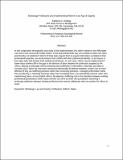Brokerage Professions and Implementing Reform in an Age of Experts
Author(s)
Kellogg, Katherine C.
DownloadKellogg_Brokerage Professions and Implementing Reform in an Age of Experts.pdf (307.2Kb)
OPEN_ACCESS_POLICY
Open Access Policy
Creative Commons Attribution-Noncommercial-Share Alike
Terms of use
Metadata
Show full item recordAbstract
In this comparative ethnographic case study of the implementation of a reform related to the Affordable Care Act in two community health centers, I find that professionals may not compete to claim new tasks (and thereby not implement reform) if these tasks require them to acquire information unrelated to their professional expertise, use work practices that conflict with their professional identity, or do impure or low-value tasks that threaten their professional interests. In such cases, reform may be implemented if lower-status workers fill in the gaps in the division of labor between the professions targeted by the reform, playing a brokerage role by protecting each profession’s information, meanings, and tasks in everyday work. When the new tasks represent professionally ill-defined problems, brokers can be more effective if they use buffering practices rather than connecting practices--managing information rather than transferring it, matching meanings rather than translating them, and maintaining interests rather than transforming them--to accomplish reform. By playing a buffering role in the interstices between existing professional jurisdictions, lower-status workers can carve out their own jurisdiction, becoming a brokerage profession between existing professions that need to collaborate with one another for reform to occur.
Date issued
2014-08Department
Sloan School of ManagementJournal
American Sociological Review
Publisher
SAGE Publications
Citation
Kellogg, Katherine C. “Brokerage Professions and Implementing Reform in an Age of Experts.” American Sociological Review 79, no. 5 (August 26, 2014): 912-941.
Version: Author's final manuscript
ISSN
0003-1224
1939-8271